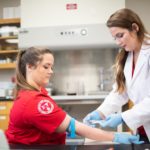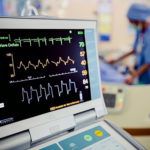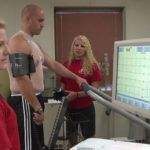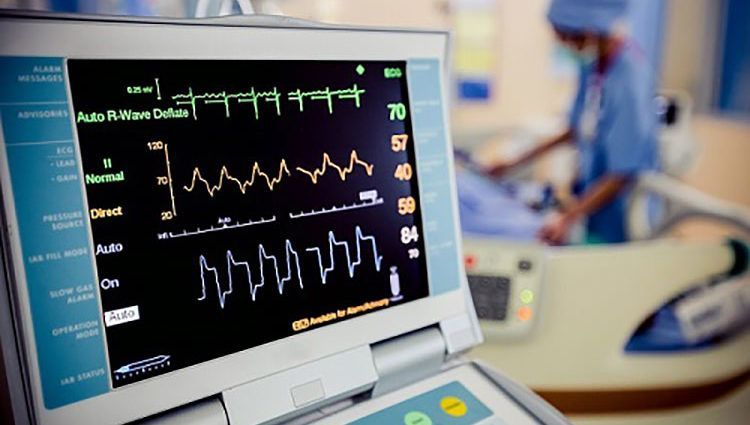How to become an EKG Technician
An electrocardiograph or electrocardiogram technician, better known as an EKG or ECG technician, is a cardiovascular medical expert who aids the doctor in identifying and treating heart conditions through the use of electrodes and sophisticated medical devices.
Education Requirements
Becoming an EKG technician demands a high school diploma or an equivalent General Equivalency Diploma (GED). It is the minimum required education level and cannot be substituted. For prospects willing to enter the healthcare industry as EGK techs but who never finished high school, a GED equivalency program is the fastest way to meet the minimum education for the job.
Online GED exams are not available. Fees differ from state to state. Pricing ranges from tens to hundreds of dollars. For example, Maryland has the lowest total price of $45 due to state subsidy. Eligible candidates should get started by checking their state’s fees and requirements.
You must pass all four subjects of the exam:
1. Reasoning Through Language Arts:
The first part of the examination lasts 2.5 hours and focuses on evaluating the student’s reading and writing capabilities. The student must demonstrate sufficient comprehension, paraphrasing, and grammar skills in fictional and non-fictional texts.
2. Mathematical Reasoning:
The second exam component consists of algebraic and quantitative problems, almost equally divided in 115 minutes. An on-screen calculator is available for most questions.
3. Social Studies:
The third testing part lasts 70 minutes and comprises questions about economics (10%), U.S. history (20%), government science (25%), civic education (25%), geography (10%), and world knowledge (10%).
4. Science:
The final part lasts 1.5 hours and includes questions about lifeforms (40%), physics (40%), planet Earth (10%), and the Universe (10%). The questions are selected-response quizzes, apart from two open-inquiries.
Although less recognized by employers and certificate boarding entities, other high school diploma equivalency programs include:
- HiSET (High School Equivalency Test);
- TASC (Test Assessing Secondary Completion);
- CHSPE (California High School Proficiency Exam);
- HSED (High School Equivalency Diploma or HEP);
- Adult high school.
Entry-Level Training & On The Job Training
According to the Alliance of Cardiovascular Professionals, the majority of the EKG technicians have received on-the-job training as their primary training method. However, these EKG tech professionals have less experience and are considered entry-level technicians. The hands-on training usually takes between four to six weeks, and it’s performed under the supervision of a cardiologist doctor or EKG supervisor. Although the training time under this method is reduced compared to most certification programs, it will most likely result in an entry-level salary, very much under the median annual salary of $56,850 ($27.33 per hour). More complex procedures such as stress tests and Holter monitoring require a prolonged training time, which can amount to 18 to 24 months.
Employers usually favor such a fast, on-the-job training because of the non-invasive nature of the job and reduced risks of malpractice. Nevertheless, obtaining an official certification from a reputable entity has multiple benefits and guarantees, especially when talking about seizing employment opportunities and higher salaries. Furthermore, having a post-secondary school or experience in the same or other medical fields may also contribute to a better job opportunity.
Whether the EKG technician prospect enrolls in an in-house training program or that of an independent boarding agency, they must grasp the following skills:
- Anatomy and physiology of the cardiovascular system;
- Heart attack pathology and disease processes;
- Cardiovascular pathology processes;
- Medical ethics, law, and administration;
- Electrocardiography principles;
- Echocardiography principles;
- Computer operation, maintenance, and troubleshooting;
- Adequate wiring, lead, and electrode positioning;
- Medical specific medical terminology;
- Patient care safety and guidance;
- Cardiac conduction and cycles;
- Heart rate rhythm and blood pressure analysis;
- Wave and interval measures;
- Front office patient care;
- Stress testing through Holter and treadmill pacemaker equipment;
- Data compilation into electronic health records.
How to become a Certified EKG Technician
There are no legal state requirements for working as an EKG technician in the U.S. Although the states classify individuals who work as cardiac technicians as an “unlicensed assistant personnel,” the industry has developed a de facto requirement of certificate programs for employment and career path development. There are little to no state or federal regulations for EKG technicians due to its non-invasive nature. Nonetheless, health care facilities establish and administer their separate conditions and necessities.
Obtaining official certification usually takes one to two years of learning and attending practice classes. Typically, the two-year programs result in a valuable associate degree. Additionally, for a substantially higher EKG technician salary and job opportunities, a four-year college bachelor’s degree is the best solution. Most universities accept credit transfer from demonstrable working experience or have completed an associate degree and CAAHEP-approved certifications, reducing the time for obtaining a bachelor’s degree. Having completed a major in cardiopulmonary sciences proves that the candidate is fit for most medical assistant duties.
The most well-recognized certifications are the ones approved by the Commission on Accreditation of Allied Health Education Programs (CAAHEP). It’s essential to keep in mind that most insurance providers, such as Medicare, will cover legal and medical costs only if the EKG tech has an official health care certification. In essence, many employers value an attested certification due to the litigious nature of the medical industry. Patients may sue the clinic, and having an uncertified technician might represent a vulnerability.
How to become an EKG technician
There are multiple certifying boards across the U.S. Some even offer exclusive online training in just a couple of weeks. Still, online certifications are less recognized and are considered somewhat superficial. Some of the most renown EKG certifying organizations are:
- Cardiovascular Credentialing International (CCI);
- American Certification Agency for Healthcare Professionals (ACA);
- American Society of Phlebotomy Technicians (ASPT);
- National Healthcareer Association (NHA);
- American Society of EKG Technicians (ASET).
A good piece of advice for prospects who haven’t yet pursued any certifications is to get started by informing themselves thoroughly about the recognized institutions of their potential employer. By contacting the desired workplaces before committing to a specific boarding agency, the health care worker can choose a satisfactory certification program, save money, and time.
Some EKG accreditations require having work experience while others do not. Most of them require a certain number of working hours or several completed EKG readings.
Policy and schedules differ from one organization to another. For example, direct walk-ins are not always available. Prospects should always call first before venturing to participate in a training program. Scheduling saves time and money because many agencies offer discounts for planning ahead of time.
Once the certified EKG technician has completed basic training, they can opt to expand their medical assisting knowledge by obtaining specific credentialing. For instance, the American Registry of Diagnostic Medical Sonographers (ARDMS) awards the Registered Diagnostic Cardiac Sonographer (RDCS) credential and the Cardiovascular Credentialing International (CCI), which confers the Electrophysiology Registered Cardiac Electrophysiology Specialist (RCES) credential. Acquiring said credentials allow the certified EKG technician to seize more job opportunities and higher salaries. In fact, an EKG tech with CAAHEP-approved certification, college associate degree, bachelor’s degree, or official credentialing is expected to earn wages in the upper 75% segment of annual salaries around $75,240 ($36.17 per hour).
Maintaining Your EKG Technician Certification
As previously mentioned, formal education or certification is not required under United States law. Nonetheless, maintaining up to date accreditation protects all the parties involved and maintains the job market competitivity of the EKG tech.
Every certification agency has different proceedings and fees for re-certification. The majority require an annual or biannual cost varying from tens to hundreds of dollars, continuing education, and in some cases, re-examination. It is wise to keep the re-certification policy in mind when deciding which certification to persevere. For instance, some boarding agencies might allow multiple attempts for re-certification exams, while others may not have re-certification exams at all. Some agencies might require bureaucratic procedures, while others might have facilitated customs.
Find Employment
According to the official page of the U.S. Bureau of Labor Statistics, cardiovascular and EKG technician job prospects are expected to grow by 22% in the 2018-2028 decade. The global population is getting older, increasing heart disease incidence, and the need for EKGs. Furthermore, citing the World Health Organization, cardiovascular diseases (CVDs) are the first cause of global mortality.
The first step in finding employment would be to compile a list of medical clinics, hospitals, laboratories, private polyclinics, imaging centers, outpatient clinics, and other relevant medical offices in the area you wish to work. Keep in mind that wages depend on the type of workplace as well as the geographical location.
Candidates should always call as many employers as possible and inquire about the job description and requirements. Due to the somewhat decentralized nature of U.S. healthcare, different institutions require different job specifications. Contact the human resources department of your desired workplace and ask what type of EKG technicians they accept. Some companies need basic EKG technicians, while others may be looking for electrocardiogram technicians with advanced training capable of assisting in other clinical duties. Write the qualifications down and create a shortlist compatible with your level of training.
Relevant EKG jobs are posted in local newspapers, online, or through job placement agencies. Some certifying agencies have job employment programs for graduates, but even those without can help with finding a job. One of the essential things for securing a job opportunity is professionalism, an excellent first impression, and a well-written CV. The candidate should practice his speech, be respectful, but at the same time confident, dress to impress, and avoid using slang language or unnecessary body gesticulation. For the medical field and scientific job posts, it’s better to use a CV rather than a shorter resume. The applicant should check for grammar errors and avoid detrimental information such as past salaries, work disputes, or religious and ideological affiliations. The formatting and writing font should give the CV a clean and aerated look. It’s essential to customize the document for easy reading. Finally, the EKG curriculum vitae must maintain information accuracy, font consistency, include a small, professional photo, and keep the length under three or four pages.
Become an EKG technician
Some examples of interview questions:
Q: How do you ensure quality and safety standards?
A: An ideal EKG Technician starts the workday by methodically sanitizing the instruments and clinic room, checks that the supplies are stocked, and inspects the EKG devices to be in perfect running order.
Q: What is the most crucial quality of an EKG tech?
A: An EKG technician must be, above all, attentive to the EKG readings. Second of all, he must be emphatic and supportive of the patient’s needs.
Q: Are you a fit person, can you manage stress?
A: The EKG technician must be able to maintain calm under distress situations and be physically fit in order to help patients, manipulate the heavy EKG machine, and stand on their feet for prolonged hours.
Q: How do you handle a distressed and uncooperative patient?
A: The EKG technician must remain calm and reassuring while explaining the procedure step by step. He must inform the patient about the benefits as well as the risks, and make him understand that the procedure is in his best interest.
Q: Did you ever commit an error? How did you fix it?
A: The EKG technician should be sincere and admit an error from their past, describe the systematic method used in resolving it, and discuss the lessons learned from the experience.
Become An EKG Monitor Technician
Advancing to an EKG Monitor Technician professionals follows the same basic principals as becoming an EKG Technician. Most certifying organizations that accredit EKG techs can further one’s education towards becoming an EKG Monitor Technician. Training consists of advanced ECG monitoring, stress tests, Holter monitoring, and taking vital signs. Costs vary between hundreds and thousands of dollars. It usually includes practical and theoretical classes, and some organizations offer advantageous scholarship loans. A community college typically provides lower-cost programs.
The job of an EKG Monitor Technician is better remunerated than that of a basic EKG Technician, but the job stress and responsibilities are higher. EKG Monitor Technicians must supervise several ICU and Telemonitors of hospitalized patients and be constantly aware of their heart activity and be ready to jump to their aid in case of fibrillations, infractions, or other abnormalities.
The most recognized telemetry monitoring certification program is the Certified Cardiographic Technician (CCT), granted through the Cardiovascular Credentialing International (CCI) organization. Renewal is required every three years through continuing education, compliance with the CCI Code of Ethics, and payment of a fixed fee. Further advancement of knowledge is also available through the institution and includes electrophysiology, cardiac catheterization, vascular ultrasound, and cardiac sonography.








